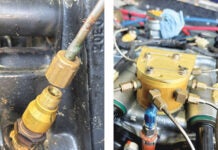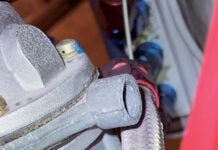Lycoming Engines issued a press release regarding University of North Dakota’s problem with the use of UL94 fuel in their fleet:
 In June 2023, the University of North Dakota (UND) Aviation program transitioned its fleet from 100LL to use UL94, a 94-octane unleaded fuel. In October, after logging 46,000 hours using UL94, UND identified abnormal valve seat recession in its Lycoming engines. Following a risk assessment, UND announced its decision to revert back to 100LL.
In June 2023, the University of North Dakota (UND) Aviation program transitioned its fleet from 100LL to use UL94, a 94-octane unleaded fuel. In October, after logging 46,000 hours using UL94, UND identified abnormal valve seat recession in its Lycoming engines. Following a risk assessment, UND announced its decision to revert back to 100LL.
Lycoming Engines conducted a root cause analysis of this issue, including further testing of UL94. This analysis has determined that the engine components and airframe components conform to specification and are not believed to contribute to valve seat recession. However, testing has also demonstrated that, under certain conditions, use of UL94 may impact valve seat recession.
Analysis indicates that aromatic concentration tolerances for UL94 may contribute to valve seat recession in certain flight profiles. Aromatic limits are not directly specified by ASTM D7547, and elevated aromatic concentration may result in slower flame speed, radiant heat from particulates, and particulate abrasiveness to valve seats that may contribute to valve seat recession.
Lycoming Engines is working with the Federal Aviation Administration to evaluate the sensitivity of piston engines to aromatics in fuels. If indicated by this further analysis, we will work with industry to further define ASTM D7547 provide appropriate guidance to operators regarding how leaning techniques can impact valve seat recession with high aromatic fuels.
Lycoming Engines remains committed to the FAA Eliminate Aviation Gasoline Lead Emissions (EAGLE), a cross-functional industry effort to identify and deploy a high- octane unleaded replacement for 100LL for piston-engine aircraft by the end of 2030.














So, the next question is for GAMI to indicate how much ‘aromatics ‘ are in G100UL ?
Their testing didn’t report any valve seat erosion.
Ok when automobile engines were switched to unleaded fuel I was a hit rodder. It became common knowledge real fast that unless you installed hardened valve seats your valve sets would recede into the head because the lead was a lubricant. I personally tested it on a 350ci Chevy left stock except for a balance and blueprint. After 21 thousand miles of hard use comparable to the aircraft use of constant load at high rpms the stock valve seats were junk. The heads were rebuilt with hardened seats and the engine is still in use today with no ill effects. So if everyone just understands that the valve seats need to be changed to hardened types there will be no issues.